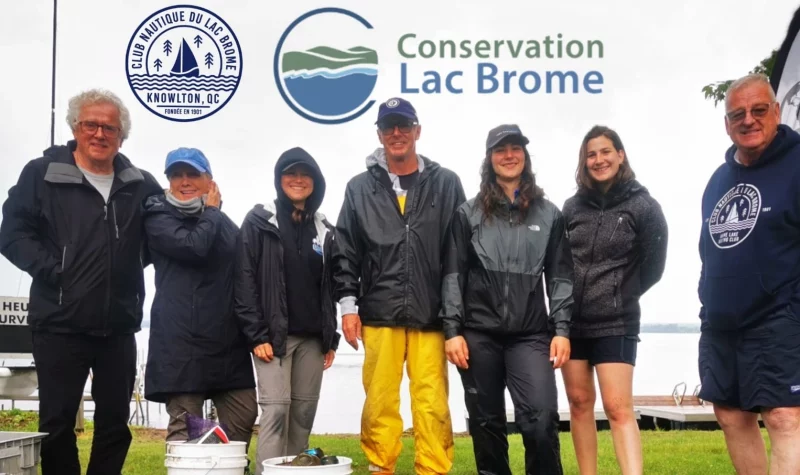After a successful first year, Conservation Lac-Brome (CLB) and Faisons nôtre part - a group of divers and volunteers that work together to clean Quebec’s water bodies - partnered up once again to clean up certain areas of Lake Brome last weekend. For this year’s initiative, the groups collaborated with the Knowlton Boat Club and concentrated their efforts around Douglas Beach, in front of the boat club, and around Eagle Island.
Last year, the two organizations worked together to clean up the lake nearing Camping des Érables, where they collected around 500 kilos of waste. Recognizing that other areas of the lake could use a helping hand, Conservation Lac-Brome decided to invite Faisons nôtre part to come back for a second clean-up.
Around 30 divers and volunteers participated in the event. They collected a variety of items from the bottom of the lake for a total of another 500 kilos. With the results of Conservation Lac-Brome’s most recent study suggesting that Lake Brome is still vulnerable, these initiatives are of utmost importance to building a community that works together to take care of the lake.
“Our whole reason for existing is to take care of the lake and to make sure that the lake is as clean and safe as possible for everybody that wants to use it. When we saw all of the junk pulled out of Camping des Érables, we said ‘you know what, there are other spots that need it as well.’ So we worked with Faisons nôtre part and we brought them back to clean up from the boat club, in front of Douglas Beach, and then across to Eagle Island,” said Don Joyce, member of CLB’s board of directors and one of the organizers of the event.
Joyce said that those involved were “pleasantly surprised” with the conditions of the lake around the boat club and in front of Douglass Beach.
“It was really not in bad shape. They pulled out a bunch of things, but not the volume that we were afraid of. When we got across to Eagle Island, that was a completely different story,” he highlighted. “They pulled out probably four times more junk in the afternoon at Eagle Island than they did in front of the boat club and Douglass Beach.”
Over 200 beer bottles and soft drink bottles were found, a number of sunglasses, water bottles, and more. Joyce noted that he thinks one of main reasons why they found so much waste around Eagle Island is because there is a history of people tying up their boats there and “tossing their empties over the side.”
“The biggest and heaviest thing that we pulled out was the head of an old motor that someone had screwed a chain into and used it as an anchor but it was still leaking a little bit of oil, it was quite gross,” said Joyce.
Joyce highlighted the various impacts that the unwanted waste has on the lake, primarily plastics, and the safety of those wanting to enjoy the water.
“One personal thing that I was really keen on doing was pulling up the bottles because here at the boat club kids are in the water all the time. Anytime there is bottles or glass it can be a real danger. That’s what was primarily driving the boat club’s involvement,” he explained. “(…) Besides the oil coming off of the old motor head, we think we pulled out something that looks like a weird battery, we aren’t quite sure. We had to use gloves to take out, we didn’t want to take the chance that there might be acid in there. Then there is also a lot of plastics and the plastics are becoming more of a concern. They break down and they get into the ecosystem, the crustaceans eat them and the fish eat the crustaceans.”
As Lake Brome remains vulnerable, these types of initiatives are important to the preserving the health of the lake and encouraging people to play their part, according to Joyce.
“It was great to call in the volunteers and bring people together because it does form that community of people that care about the lake. The other things is that it’s always good to raise visibility of the importance taking care of the lake and the lake’s ecology. It’s an opportunity to let people know that everyone has a piece of the lake and everyone should be proud about taking care of it,” he said.
Listen to the full interview below:


